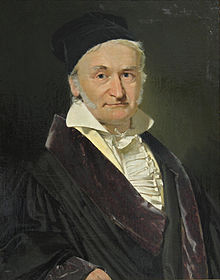Carl Friedrich Gauss
Si Johann Carl Friedrich Gauss (/ɡaʊs/; Aleman: Gauß [kaʁl ˈfʁiːdʁɪç ˈɡaʊs] (![]() dangogon);[1][2] ; Abril 30, 1777- Pebrero 23, 1855) sarong matematikong Aleman asin pisiko na nagtaong importanteng kontribusyon sa matematika asin siyensya.[3] Midbid na Princeps mathematicorum[4] (Latin for "the foremost of mathematicians") asin "the greatest mathematician since antiquity". Si Gauss igwang matibay na impluwensiya sa Matematika asin Siyensya, asin kabali sa pinaka-impluwensiyal na mga matematiko sa kasaysayan.[5]
dangogon);[1][2] ; Abril 30, 1777- Pebrero 23, 1855) sarong matematikong Aleman asin pisiko na nagtaong importanteng kontribusyon sa matematika asin siyensya.[3] Midbid na Princeps mathematicorum[4] (Latin for "the foremost of mathematicians") asin "the greatest mathematician since antiquity". Si Gauss igwang matibay na impluwensiya sa Matematika asin Siyensya, asin kabali sa pinaka-impluwensiyal na mga matematiko sa kasaysayan.[5]
Mga sinurat
baguhon- 1799: Doctoral dissertation on the fundamental theorem of algebra, with the title: Demonstratio nova theorematis omnem functionem algebraicam rationalem integram unius variabilis in factores reales primi vel secundi gradus resolvi posse ("New proof of the theorem that every integral algebraic function of one variable can be resolved into real factors (i.e., polynomials) of the first or second degree")
- 1801: Disquisitiones Arithmeticae (Latin). A German translation by H. Maser Untersuchungen über höhere Arithmetik (Disquisitiones Arithmeticae & other papers on number theory) (Second ed.). New York: Chelsea. 1965. ISBN 978-0-8284-0191-3., pp. 1–453. English translation by Arthur A. Clarke Disquisitiones Arithmeticae (Second, corrected ed.). New York: Springer. 1986. ISBN 978-0-387-96254-2..
- 1808: Theorematis arithmetici demonstratio nova. Göttingen: Commentationes Societatis Regiae Scientiarum Gottingensis. 16.. German translation by H. Maser Untersuchungen über höhere Arithmetik (Disquisitiones Arithmeticae & other papers on number theory) (Second ed.). New York: Chelsea. 1965. ISBN 978-0-8284-0191-3., pp. 457–462 [Introduces Gauss's lemma, uses it in the third proof of quadratic reciprocity]
- 1809: Theoria Motus Corporum Coelestium in sectionibus conicis solem ambientium (Theorie der Bewegung der Himmelskörper, die die Sonne in Kegelschnitten umkreisen), Theory of the Motion of Heavenly Bodies Moving about the Sun in Conic Sections (English translation by C.H. Davis), reprinted 1963, Dover, New York.
- 1811: Summatio serierun quarundam singularium. Göttingen: Commentationes Societatis Regiae Scientiarum Gottingensis.. German translation by H. Maser Untersuchungen über höhere Arithmetik (Disquisitiones Arithmeticae & other papers on number theory) (Second ed.). New York: Chelsea. 1965. ISBN 978-0-8284-0191-3., pp. 463–495 [Determination of the sign of the quadratic Gauss sum, uses this to give the fourth proof of quadratic reciprocity]
- 1812: Disquisitiones Generales Circa Seriem Infinitam
- 1818: Theorematis fundamentalis in doctrina de residuis quadraticis demonstrationes et amplicationes novae. Göttingen: Commentationes Societatis Regiae Scientiarum Gottingensis.. German translation by H. Maser Untersuchungen über höhere Arithmetik (Disquisitiones Arithmeticae & other papers on number theory) (Second ed.). New York: Chelsea. 1965. ISBN 978-0-8284-0191-3., pp. 496–510 [Fifth and sixth proofs of quadratic reciprocity]
- 1821, 1823 and 1826: Theoria combinationis observationum erroribus minimis obnoxiae. Drei Abhandlungen betreffend die Wahrscheinlichkeitsrechnung als Grundlage des Gauß'schen Fehlerfortpflanzungsgesetzes. (Three essays concerning the calculation of probabilities as the basis of the Gaussian law of error propagation) English translation by G.W. Stewart, 1987, Society for Industrial Mathematics.
- 1827: Disquisitiones generales circa superficies curvas, Commentationes Societatis Regiae Scientiarum Gottingesis Recentiores. Volume VI, pp. 99–146. "General Investigations of Curved Surfaces" (published 1965), Raven Press, New York, translated by J. C. Morehead and A. M. Hiltebeitel.
- 1828: Theoria residuorum biquadraticorum, Commentatio prima. Göttingen: Commentationes Societatis Regiae Scientiarum Gottingensis. 6.. German translation by H. Maser
- 1828: Untersuchungen über höhere Arithmetik (Disquisitiones Arithmeticae & other papers on number theory) (Second ed.). New York: Chelsea. 1965. pp. 511–533. ISBN 978-0-8284-0191-3. [Elementary facts about biquadratic residues, proves one of the supplements of the law of biquadratic reciprocity (the biquadratic character of 2)]
- 1832: Theoria residuorum biquadraticorum, Commentatio secunda. Göttingen: Commentationes Societatis Regiae Scientiarum Gottingensis. 7.. German translation by H. Maser Untersuchungen über höhere Arithmetik (Disquisitiones Arithmeticae & other papers on number theory) (Second ed.). New York: Chelsea. 1965. ISBN 978-0-8284-0191-3., pp. 534–586 [Introduces the Gaussian integers, states (without proof) the law of biquadratic reciprocity, proves the supplementary law for 1 + i]
- "Intensitas vis magneticae terrestris ad mensuram absolutam revocata". Commentationes Societatis Regiae Scientiarum Gottingensis Recentiores 8: 3–44. 1832. English translation
- 1843/44: Untersuchungen über Gegenstände der Höheren Geodäsie. Erste Abhandlung, Abhandlungen der Königlichen Gesellschaft der Wissenschaften in Göttingen. Zweiter Band, pp. 3–46
- 1846/47: Untersuchungen über Gegenstände der Höheren Geodäsie. Zweite Abhandlung, Abhandlungen der Königlichen Gesellschaft der Wissenschaften in Göttingen. Dritter Band, pp. 3–44
- Mathematisches Tagebuch 1796–1814, Ostwaldts Klassiker, Verlag Harri Deutsch 2005, mit Anmerkungen von Neumamn, ISBN 978-3-8171-3402-1 (English translation with annotations by Jeremy Gray: Expositiones Math. 1984)
Hilingon man
baguhonMga toltolan
baguhonMga Nota
baguhonCitations
baguhon- ↑ Dudenredaktion; Kleiner, Stefan; Knöbl, Ralf (2015) [First published 1962]. Das Aussprachewörterbuch [The Pronunciation Dictionary] (in German) (7th ed.). Berlin: Dudenverlag. pp. 246, 381, 391. ISBN 978-3-411-04067-4.
- ↑ Krech, Eva-Maria; Stock, Eberhard; Hirschfeld, Ursula; Anders, Lutz Christian (2009). Deutsches Aussprachewörterbuch [German Pronunciation Dictionary] (in German). Berlin: Walter de Gruyter. pp. 402, 520, 529. ISBN 978-3-11-018202-6.
- ↑ "Gauss, Carl Friedrich". Encyclopedia.com. Retrieved 17 September 2018.
- ↑ Zeidler, Eberhard (2004). Oxford Users' Guide to Mathematics. Oxford, UK: Oxford University Press. p. 1188. ISBN 978-0-19-850763-5.
- ↑ Dunnington, Waldo (1927). "The Sesquicentennial of the Birth of Gauss". Scientific Monthly 24 (5): 402–414. Bibcode: 1927SciMo..24..402D. http://www.mathsong.com/cfgauss/Dunnington/1927/. Also available at "The Sesquicentennial of the Birth of Gauss". Retrieved 23 February 2014. Comprehensive biographical article.
Ginikanan
baguhon- Dunnington, G. Waldo (2004). Carl Friedrich Gauss: Titan of Science. The Mathematical Association of America. ISBN 978-0-88385-547-8. OCLC 53933110.
- Nahin, Paul J. (2010). An Imaginary Tale: The Story of √-1. Princeton University Press. ISBN 978-1-4008-3389-4.
Magbasa pa lalo
baguhon- Bühler, Walter Kaufmann (1987). Gauss: A Biographical Study. Springer-Verlag. ISBN 978-0-387-10662-5.
- Gauss, Carl Friedrich (1965). Disquisitiones Arithmeticae. tr. Arthur A. Clarke. Yale University Press. ISBN 978-0-300-09473-2.
- Hall, Tord (1970). Carl Friedrich Gauss: A Biography. Cambridge, MA: MIT Press. ISBN 978-0-262-08040-8. OCLC 185662235.
- Kehlmann, Daniel (2005). Die Vermessung der Welt. Rowohlt. ISBN 978-3-498-03528-0. OCLC 144590801.
- Sartorius von Waltershausen, Wolfgang (1856). Gauss: A Memorial. S. Hirzel.
- Simmons, J. (1996). The Giant Book of Scientists: The 100 Greatest Minds of All Time. Sydney: The Book Company.
- Tent, Margaret (2006). The Prince of Mathematics: Carl Friedrich Gauss. A.K. Peters. ISBN 978-1-56881-455-1.
- Chisholm, Hugh, ed. (1911). "Gauss, Karl Friedrich". Encyclopædia Britannica (in English) (11th ed.). Cambridge University Press.
Panluwas na takod
baguhon| An Wikimedia Commons igwa nin medya dapit sa Johann Carl Friedrich Gauß. |
- Carl Friedrich Gauss Werke – 12 vols., published from 1863–1933
- Gauss and his children
- Gauss biography
- Carl Friedrich Gauss – Biography at Fermat's Last Theorem Blog
- Gauss: mathematician of the millennium, by Jürgen Schmidhuber
- English translation of Waltershausen's 1862 biography
- Gauss general website on Gauss
- MNRAS 16 (1856) 80 Obituary
- Carl Friedrich Gauss on the 10 Deutsche Mark banknote Archived 2011-12-13 at the Wayback Machine.
- "Carl Friedrich Gauss" in the series A Brief History of Mathematics on BBC 4
- Grimes, James. "5050 And a Gauss Trick". Numberphile. Brady Haran. Archived from the original on 11 April 2013. Unknown parameter
|url-status=ignored (help) - Carl Friedrich Gauß at the Göttingen University

